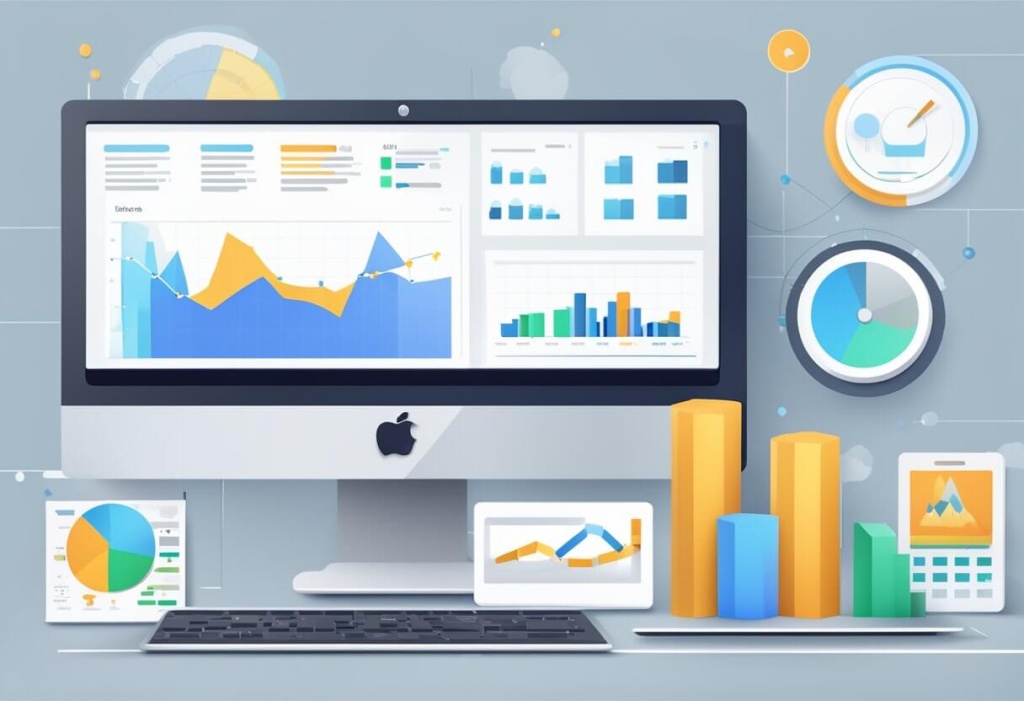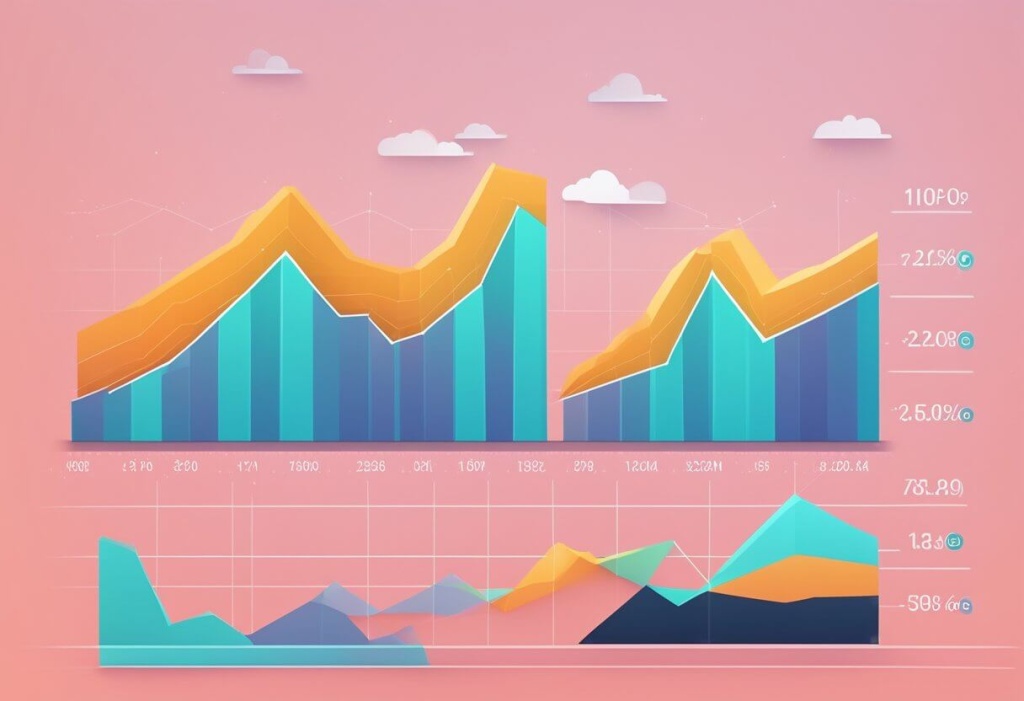Businesses can benefit greatly from using analytics on their website. Website analytics is the process of collecting and analyzing data about website traffic and usage. This data can provide valuable insights into user behavior, which can be used to make informed decisions about website design, content, and marketing strategies.
Understanding website analytics is crucial for businesses that want to enhance user experience, improve marketing effectiveness, boost conversion rates, and drive business growth. By analyzing website traffic and usage data, businesses can gain insights into user behavior, such as which pages users visit most frequently, how long they spend on each page, and which links they click on. This information can be used to optimize website design and content to better meet user needs and preferences.

Overall, website analytics is an essential tool for businesses that want to stay competitive in today’s digital marketplace. Analytics offer insights for informed decisions on design, content, and marketing, driving business growth and goal achievement.
Key Takeaways
- Understanding website analytics is crucial for enhancing user experience, improving marketing effectiveness, and boosting conversion rates.
- By analyzing website traffic and usage data, businesses can gain insights into user behavior that can be used to optimize website design and content.
- Website analytics is an essential tool for businesses that want to stay competitive in today’s digital marketplace.
Understanding Website Analytics
Website analytics is the measurement and analysis of website traffic and user behavior. By understanding how visitors interact with a website, businesses can make informed decisions to improve user experience, increase engagement, and optimize their website for better performance.
The Role of Google Analytics
Google Analytics is a widely used web analytics service that provides businesses with insights into website traffic, user behavior, and other key performance indicators. It allows businesses to track website traffic and user behavior, including page views, bounce rates, and time on site. Google Analytics also provides businesses with data on the source of website traffic, such as organic search, social media, or referral traffic.
With Google Analytics, pinpoint popular pages, traffic-driving content, and exit pages. Optimize for improved user experience and engagement.
Interpreting Data for Informed Decisions
Analyzing website data is the key to making informed decisions. By interpreting data, businesses can identify patterns and trends in user behavior, and use this information to optimize their website for better performance.
Data analysis extracts insights, detects behavior patterns, and guides informed decisions. High bounce rate? Analyze and enhance user experience.
Website analytics is crucial for optimizing performance. Using tools like Google Analytics, gain insights, identify trends, and enhance user experience.
Enhancing User Experience
Businesses can greatly benefit from using web analytics to enhance the user experience (UX) of their website. By analyzing user behavior, businesses can optimize their website design and navigation, leading to a more personalized user experience.
Analyzing User Behavior
Web analytics tools provide businesses with valuable insights into user behavior on their website. By tracking user actions, such as page views, click-through rates, and time spent on each page, businesses can gain a better understanding of how users are interacting with their website.
This data can be used to identify areas of the website that are causing frustration or confusion for users. For example, if users are spending a lot of time on a particular page but not taking any action, it may indicate that the page is unclear or lacks a clear call-to-action.
Optimizing Website Design and Navigation
Armed with the insights gained from analyzing user behavior, businesses can optimize their website design and navigation to improve the user experience. This may involve making changes to the layout, font size, color scheme, or navigation menu.
For example, if users are frequently clicking on a particular link, it may be beneficial to move that link to a more prominent location on the website. Similarly, if users are struggling to find a particular page, it may be necessary to reorganize the navigation menu to make it more intuitive.
By optimizing the website design and navigation, businesses can provide a more personalized user experience that meets the needs of their target audience. This can lead to increased engagement, longer visit durations, and ultimately, a higher conversion rate.
Businesses can greatly benefit from using web analytics to enhance the user experience of their website. By analyzing user behavior and optimizing website design and navigation, businesses can provide a more personalized user experience that meets the needs of their target audience.
Improving Marketing Effectiveness
Businesses can use website analytics to improve their marketing effectiveness. By tracking user behavior on their website, businesses can refine their marketing strategies, optimize their campaigns, and increase engagement. Here are some ways that website analytics can help businesses improve their marketing effectiveness:
Refining Marketing Strategies
Website analytics can provide businesses with valuable insights into their audience’s behavior and preferences. By tracking metrics such as page views, bounce rates, and time on page, businesses can identify which pages are most popular and which ones need improvement. This information can help businesses refine their marketing strategies and create content that resonates with their audience.
If a blog post gains traction, create similar content to attract more visitors. Analyze keywords for SEO optimization and higher rankings.
Tracking and Increasing Engagement
Website analytics can also help businesses track and increase engagement with their audience. By monitoring metrics such as click-through rates, conversion rates, and social media shares, businesses can identify which marketing campaigns are most effective and which ones need improvement.
If a social media post gains traction, create similar content for more followers. Analyze audience demographics for targeted marketing.
Website analytics can help businesses improve their marketing effectiveness by providing valuable insights into their audience’s behavior and preferences. By refining their marketing strategies and increasing engagement, businesses can attract more visitors, improve their conversion rates, and ultimately increase their revenue.
Boosting Conversion Rates
One of the most significant benefits of using website analytics is the ability to boost conversion rates. A conversion rate is the percentage of website visitors who take a desired action, such as making a purchase or filling out a contact form. By analyzing conversion data, businesses can identify areas of their website that need improvement to increase conversions.
Understanding Conversion Metrics
To improve conversion rates, businesses must first understand their current conversion metrics. This includes tracking the number of visitors to their website, the number of conversions, and the conversion rate. By analyzing this data, businesses can identify which pages are driving the most conversions and which pages need improvement.
A/B Testing for Higher Conversions
A/B testing is a powerful tool that can help businesses improve their conversion rates. The process of A/B testing means creating two versions of a web page and testing them against one another to determine which one performs better. Businesses can determine which changes result in higher conversion rates by testing various elements such as headlines, images, and calls-to-action.
To get the most out of A/B testing, businesses should test one element at a time and track the results. This allows them to identify which changes are having the biggest impact on conversion rates. By continually testing and optimizing their website, businesses can improve their conversion rates over time.
In conclusion, website analytics enhance conversion rates, improving online performance. Analyze data, metrics, and conduct A/B testing for improvements.

Driving Business Growth
Business growth is a top priority for companies of all sizes. To achieve this, businesses need to make informed decisions based on data-driven insights. Analytics can help businesses leverage data to make strategic decisions that drive growth.
Leveraging Data for Strategic Decisions
Analytics can provide businesses with valuable insights into customer behavior, market trends, and product performance. By analyzing this data, businesses can make informed decisions about how to allocate resources and optimize their strategies to achieve their business goals.
Businesses analyze products with poor performance using analytics. Analytics guide adjustments in marketing strategies for improved ROI.
Measuring ROI and Profitability
Analytics can also help businesses measure their ROI and profitability. By tracking key performance indicators (KPIs), businesses can monitor their progress towards their goals and make adjustments as needed.
For example, if a business is launching a new product, they can use analytics to track its performance and measure its ROI. They can also use analytics to monitor their profitability and identify areas where they can reduce costs or increase revenue.
Analytics is a powerful tool that can help businesses drive growth, make data-driven decisions, and measure their ROI and profitability. By leveraging data for strategic decisions, businesses can optimize their strategies and achieve their business goals.
Frequently Asked Questions
What insights can web analytics provide to enhance business decision-making?
Web analytics offer insights into user behavior: interactions, popular pages, and time spent. Improve load times, navigation, content. Analyze for informed decisions.
How does website analytics contribute to optimizing the user experience?
Web analytics optimize user experience by analyzing interactions. Identify and fix areas causing frustration or confusion. For instance, streamline checkout.
In what ways can data from website analytics improve marketing strategies?
Website analytics enhance marketing strategies by revealing top-performing channels. Optimize spend and personalize campaigns based on user data.
How can conversion tracking through analytics impact a business’s online performance?
Conversion tracking guides marketing optimization by highlighting top-performing campaigns. Focus on effective channels and streamline conversion processes.
What role does website traffic analysis play in developing business growth strategies?
Website traffic analysis informs growth strategies by pinpointing top channels. Improve marketing, design, and content based on data. Identify new growth opportunities.
How can analyzing visitor behavior on a website lead to increased customer engagement?
Visitor behavior analysis enhances customer engagement by highlighting popular content and features. Tailor experiences with personalized recommendations. Improve design and content based on analysis.
Imtiaz is a seasoned Web Development & SEO Specialist, serving as the CEO of Innoovate. With a passion for crafting engaging online experiences, he combines technical expertise with creative vision to drive digital success.
Ready to boost your business?
Get a FREE quote from Innoovate! We do websites, SEO, social media, design, and lead generation. Let's make your business awesome!
Request a free quote
Ready to grow your business? Get a FREE quote from Innoovate! We help with websites, SEO, social media, design, and getting more leads. Let's make your business even better together!
Subscribe to our newsletter!
More from our blog
See all postsRecent Posts
- How to Choose the Best Web Design Company in Dubai June 6, 2024
- Website Development Partner: Finding the Right One May 24, 2024
- 5 Best Website Builders for Accountants May 22, 2024









